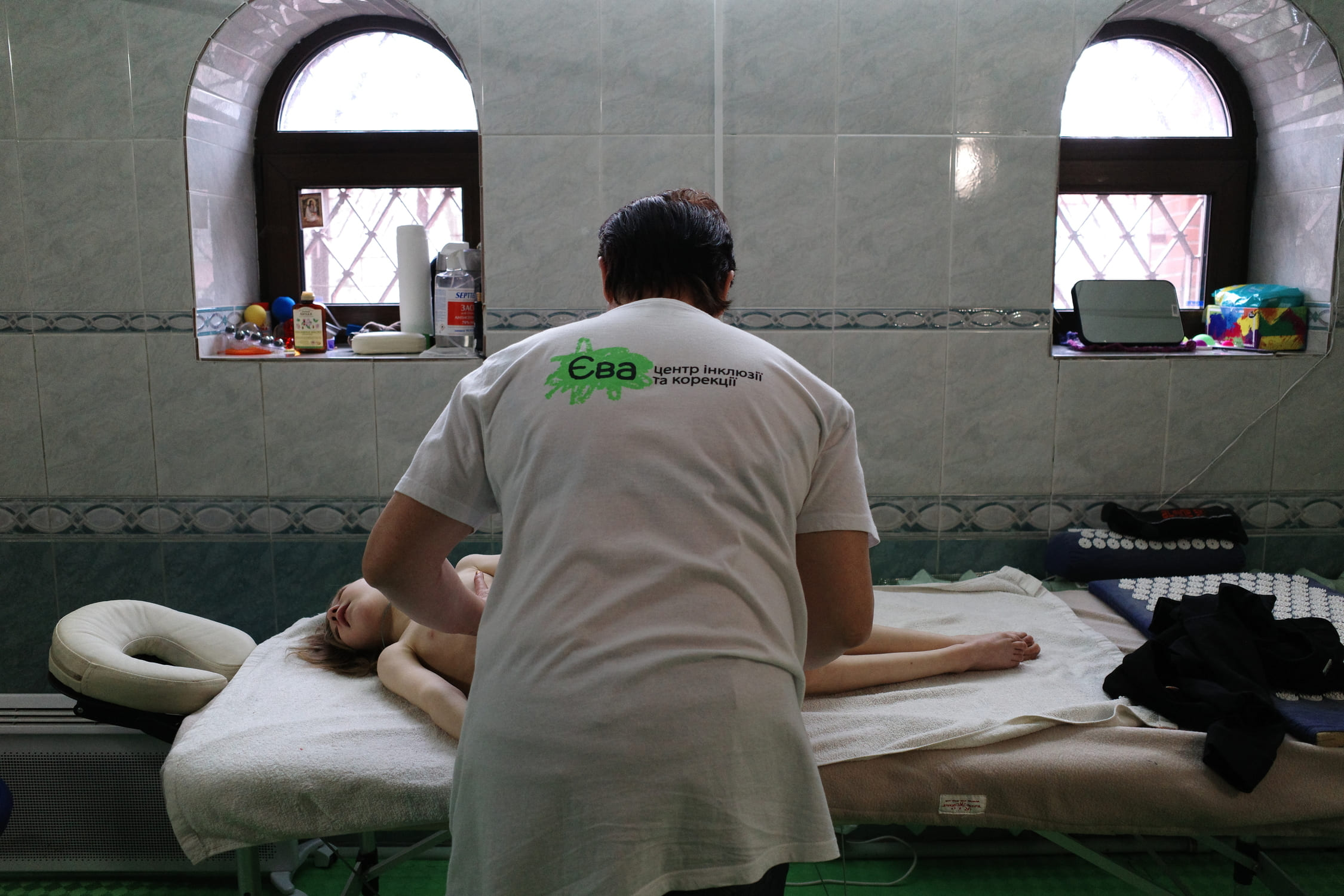"Only here did we see genuine interest." How a girl with cerebral palsy learns to live thanks to the "Eva" Center
Authors: Roman Babak, Yevhen Shyshatskyi
In the massage room, covered in tiles, there is soft light and warm air. If you close your eyes, you can only hear the rustling of caring hands on the skin and the gentle creaking of the massage table. Sometimes you can hear wheezing and snorting. Their source is a little patient of the "Eva" Inclusion and Correction Center.
Olia is 7 years old. At her age, she could already be finishing first grade, but unfortunately, fate had a different plan. Olia has a severe form of cerebral palsy. Excessive muscle tone keeps the girl’s body almost constantly arched from heels to the back of her head, and her limbs are tense like strings. She cannot sit or speak, and only recently has she learned to focus her gaze on people and objects.

As of 2020, there were 12.6 thousand children with cerebral palsy in Ukraine. This disease is incurable. With a form like Olia's, the life of the child and her parents turns into an almost hopeless struggle. Almost, because modern techniques and regular sessions allow turning a verdict into a challenge and at least slightly easing the family's life.
Today's story of the Techiia Foundation is about this. We recorded it in March, right during another therapeutic massage session.
Recognizing the trouble in time
"At the age of six months, we noticed that something was wrong," says Kateryna, Olia's mother, while the massage therapist gently strokes her daughter's belly. "She is my first child, so at first, I didn't have a clear idea of what is normal and what is not. It was only when my husband and I realized that Olia couldn't hold her head properly that we went for an examination at the Ohmatdyt hospital. And there they told us in surprise: your daughter has cerebral palsy."
The woman recalls that the delivery was difficult. The baby didn't cry immediately after birth, which likely resulted in a lack of oxygen to the brain. In the first few days, the girl began to have epileptic seizures. Doctors prescribed a heavy course of antibiotics. After a month, Kateryna and Olia were discharged, but nothing was mentioned about the diagnosis.
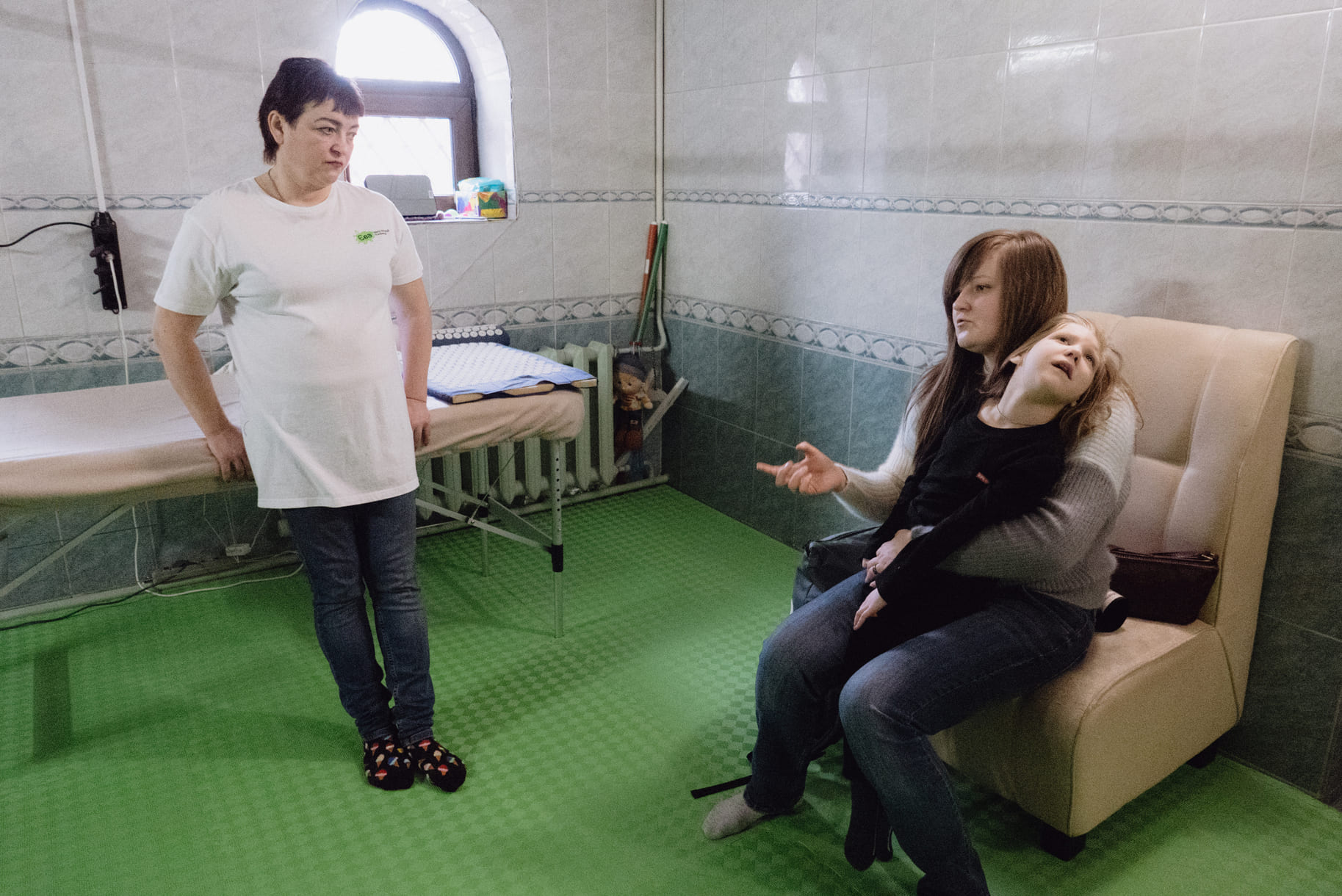
A young family was confronted with a whirlwind of information where it was difficult to distinguish the essentials, especially when their child was ill. Olia had a severe allergic reaction — her skin turned reddish-orange and started peeling after breastfeeding. But at the clinic, parents were told to first apply for disability status. Working with cerebral palsy was impossible: with such skin conditions, massages and swimming pools were off-limits for Olia. For three months, Kateryna and her husband went through all the circles of hell until finally, the Institute of Allergology provided help for their daughter.
Afterward, the parents started taking their daughter to various courses. They changed multiple centers and doctors. "Unfortunately, there are places where you pay money, they work with children, but nothing happens as a result," confesses Kateryna.
"Eva" — a new hope
Olia's parents learned about the Inclusion and Correction Center "Eva" through acquaintances. For several years, they have provided free rehabilitation for children after oncology treatment and helping children with cerebral palsy, autism spectrum disorder (ASD), Down syndrome, and other complex diagnoses. The Techiia Foundation funds the activities of the center.
Olia started her first course of sessions at the end of 2021. The "Eva" team, including rehabilitation trainer Maksym and massage therapist Aliona, have actively participated in her care.
"Only here did I see genuine interest. After all our previous experiences, we hold on tightly to the Center," says Kateryna.
The sessions were interrupted due to a large-scale invasion, but in the autumn of 2022, Kateryna and Olia resumed regular visits to "Eva." Twice a week, they attend the swimming pool, receive massages, and engage in gentle therapeutic exercises. They started with intensive exercises to observe results and then transitioned to maintenance. Overloading is not desired to prevent overwhelming the child.
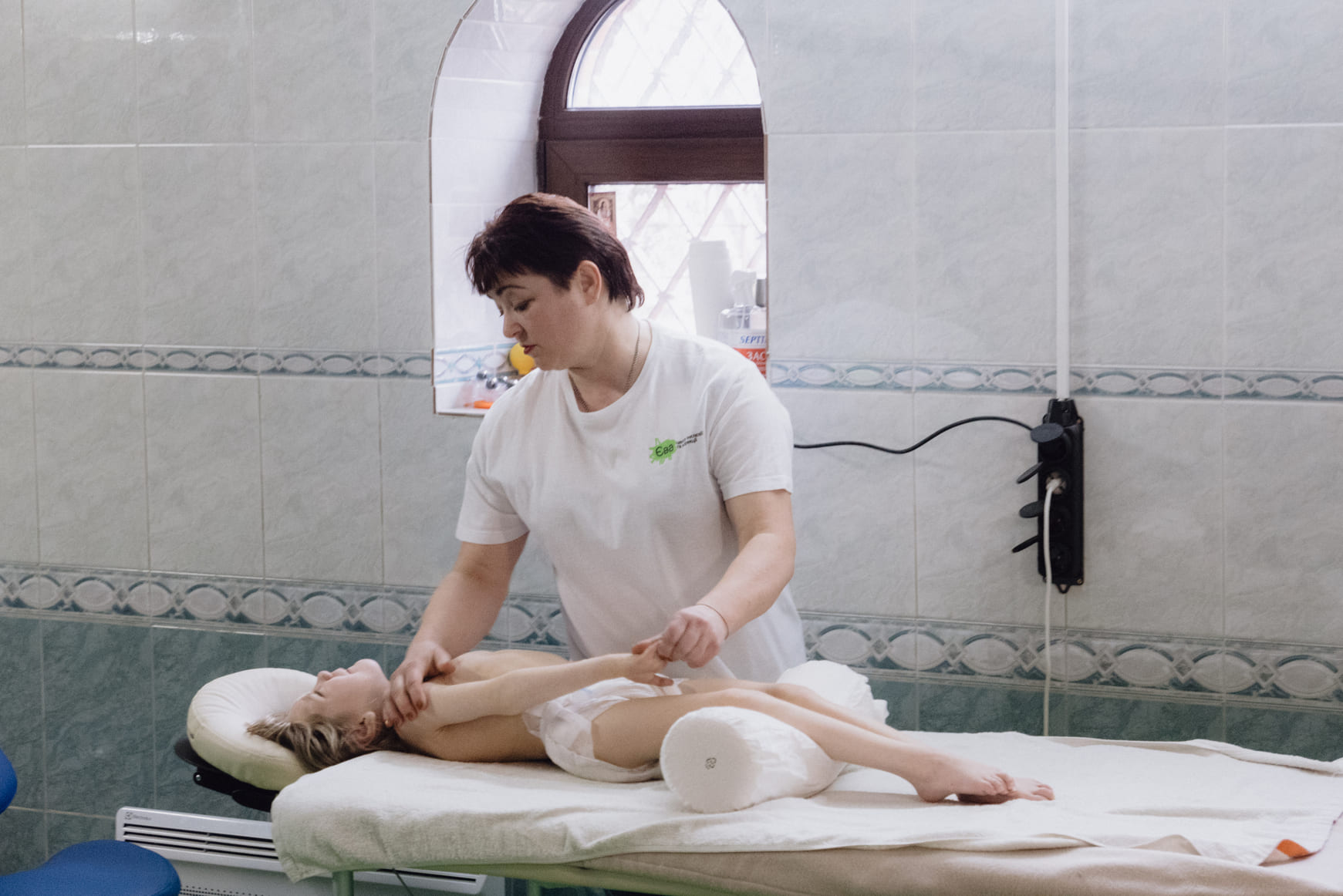
The mother noticed the effects soon enough. "The child cannot say anything, so we see all the changes externally. Firstly, after regular swimming pool sessions and massages, the head and neck started functioning better. Secondly, sleep, eating, and toileting have normalized," explains Kateryna.
Cerebral palsy in a severe form causes significant muscle tone. As Olia's mother describes, her daughter's body is usually twisted backward. The tense muscles create problems in the functioning of internal organs, and in Olia's case, the intestinal microflora is already disrupted due to antibiotic poisoning after birth. If something hasn't been properly digested and eliminated, sleep becomes difficult. As a result, the child cries a lot — it's almost her only way to signal discomfort.
The situation can only be improved through systematic professional bodywork. "And here, the hands of the massage therapist work wonders," affirms Kateryna.
After just the first few weeks of sessions, Olha started sleeping on her back. It became easier to dress her because her little arms could be bent. A significant achievement was the improvement in eye movement and focus. Olia can now turn her head, react to voices and those around her, and even smile. According to her mother, she especially responds to the voices of her grandmothers and brightens up when she hears them.
The girl does actively turn her head while the massage therapist, Aliona, works on her arms and legs. Olia's gaze stops on those present as she carefully observes. Her breathing is heavy and raspy, sometimes transitioning into snorting and a cough that resembles clearing her throat.
"It's not due to her lungs," Kateryna seems to read our thoughts. "Her throat gets very constricted, so air passes through the respiratory passages like that. But when she falls asleep, she relaxes and breathes calmly and evenly."
Two years ago, the family noticed that Olia's right thigh started protruding significantly. It turned out that she had a congenital hip dislocation. Alona shows an X-ray where it's clearly visible how the femur is entirely separate from the hip. Surgery is possible, but it would be highly traumatic for the girl, with a challenging rehabilitation period. The alternative, once again, is massages. Through them, the bone gradually returns to its place.
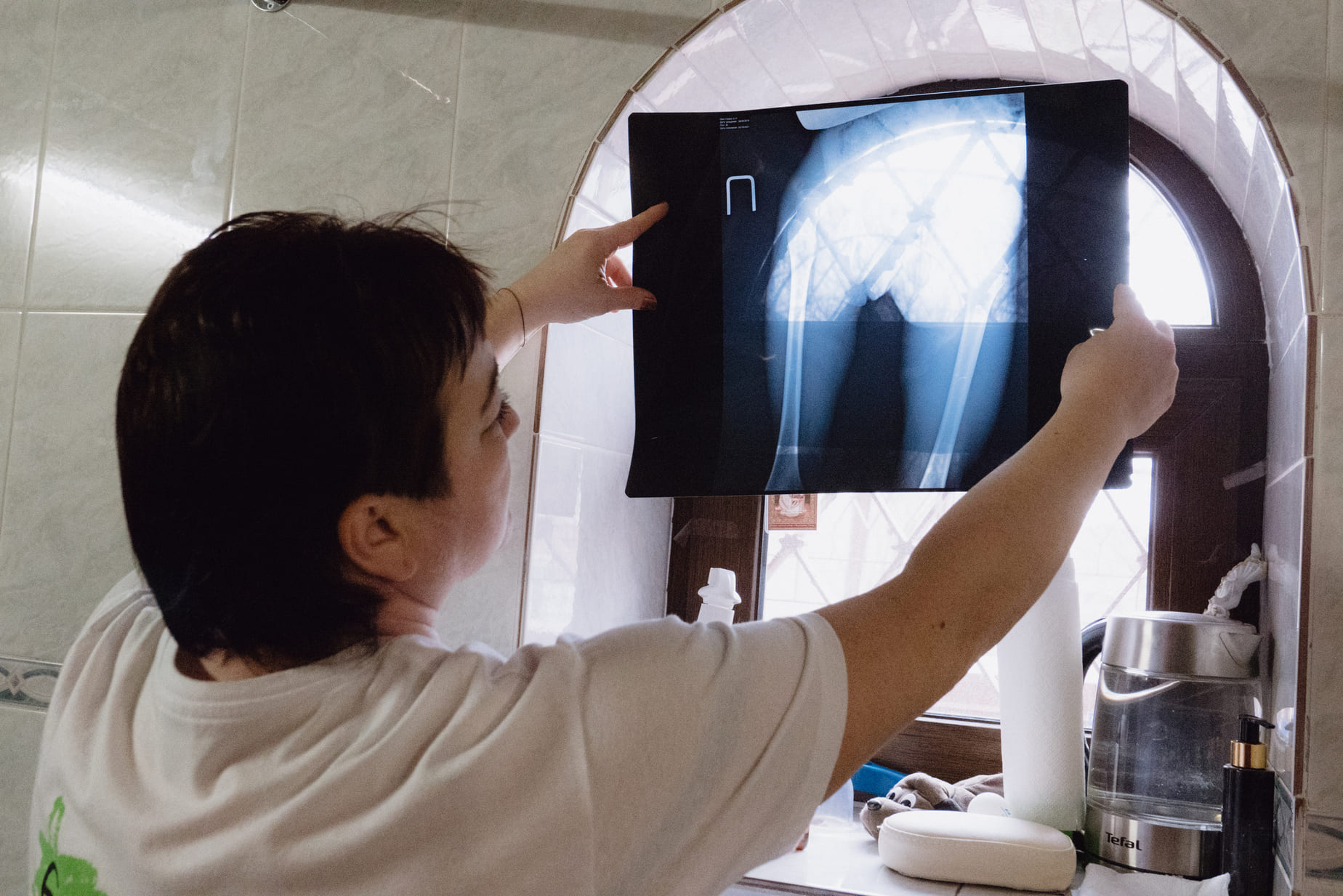
Happiness Loves Silence
Olia undergoes regular examinations, including brain scans. According to Kateryna, an independent doctor analyzed the electroencephalogram and said the dynamics remain positive.
The girl gradually gains control over her own movements. Previously, when she felt an itch on her nose, she would either contort her face or search for something to scratch it onto. Once, while Kateryna was holding her in her arms, she noticed that Olia reached out with her fingers toward her nose. It was a tremendous achievement for her.
"Thanks to the Center, we've been able to reduce the amount of pain medication," Kateryna says. "I'm starting to take more initiative myself. I realize that instead of relying on a pill, I can do exercises, give warm baths, gently massage and stretch her to make Olia feel better."
She receives great support at the Center: Maksym studies new techniques and suggests home exercises, while Aliona shares her own insights and experiences.
"I don't share about the results much because happiness loves silence," says Aliona. "We've come a long way to get here. Basically, Olia couldn't relax at all, and we could only help her a little at first. Gradually, she got used to it and started releasing tension. Now she can even fall asleep during the massage."
Although the massage may appear gentle, Olia's muscles are working at their full capacity. Along with the stimulation, salts, and waste products are being squeezed out, aiding the body with what it can't do on its own.
Aliona aims to delay the onset of kineses — the nervous system's reactions when the body responds to touch with motor reactions. The ultimate goal is to eliminate them altogether. At the beginning of the rehabilitation process, they would start around the 12th or 13th minute of the massage. As we speak, the massage session has exceeded the 30-minute mark.
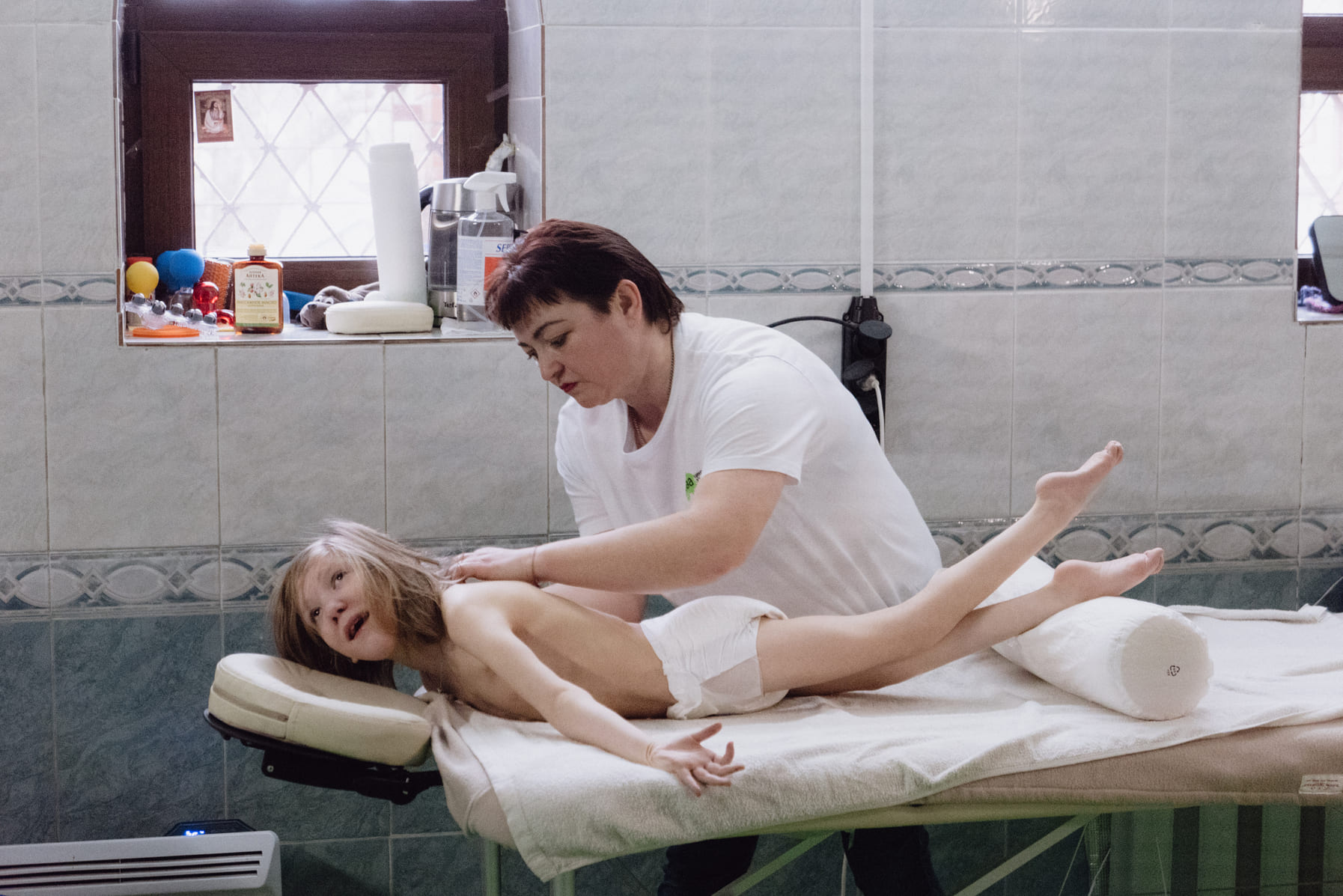
All of Olia's progress results from painstaking work, not only by "Eva" but also by her parents. Aliona is categorical in her views on working with children: "The problem is that when doctors diagnose a condition, they don't teach parents how to interact with such a child. Cerebral palsy is a task that can only be achieved through joint efforts."
After the massage, Kateryna thanks Aliona, dresses her daughter with familiar movements, lifts her up in her arms, and says goodbye. The coming days will be calmer for the family. Aliona briefly shows us Olia's photos and bids us farewell. The next little patient is already waiting for her hands and skills.
P.S. Two months later, Olia learned to move one hand independently and became more active in moving one leg. She displays emotions more clearly. The biggest achievement throughout the combination of massage and swimming pool therapy was when Olia's mother was able to sit her on her lap for the first time, and in that position, the girl could stay for a short period of time. Overall, during the training period, Olia's muscles became more elastic and responsive. Metabolism became more active, and the girl now manages without medical assistance.
Source: Facty.ua


